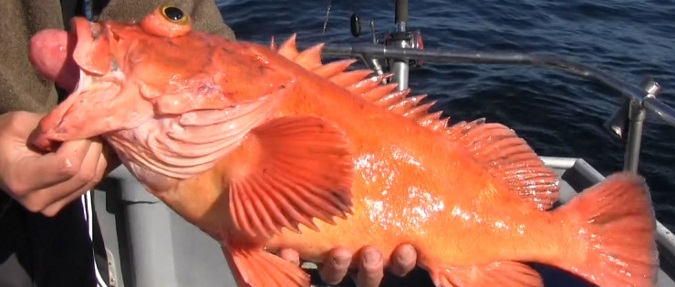
Anglers can significantly improve the survival of rockfish by using a descending device when releasing a rockfish that can’t descend on its own, helping Oregon’s fish and fisheries.
What is barotrauma?
Rockfish have a swim bladder, a gas-filled organ that helps regulate buoyancy. The gas in the swim bladder expands when a fish is brought up to the surface, resulting in barotrauma—pressure-related injury. Signs of barotrauma include a swollen body, stomach and/or esophagus protruding into the mouth, and/or distended or bulging eyes (“pop-eye”).
Because of the extra buoyancy from expanded gas, some rockfish with barotrauma may not be able to swim down from the surface on its own—it is like trying to push a basketball underwater.
Use descending devices to release rockfish
Yelloweye Rockfish with signs of barotrauma
Descending devices
A fish at the surface is highly vulnerable to further injury and predation. This is where you, the angler, can help – a variety of tools are available to return rockfish safely to depth.
These descending devices, which range from a simple inverted barbless hook to a pressure-activated clamp that opens automatically at depth, give anglers the ability to return weak or buoyant rockfish to deeper waters, reversing many of the signs of barotrauma and increasing the likelihood of that fish’s survival. Descending devices (also called recompression devices or release devices) are available at many tackle shops or online. Use the one that works best for you and your vessel’s set-up.
Get an A in avoidance
What’s better than releasing at depth? Avoidance. When fishing for non-rockfish species (halibut, lingcod), avoid habitats such as rocky pinnacles and other complex structure. Some species, such as yelloweye rockfish, are highly associated with particular habitats. When you are encountering species you must release, move to another location. Halibut anglers: two new maps show several soft-bottom areas recommended for halibut fishing with low rates of yelloweye rockfish bycatch. See maps and coordinates.
Links:
- Learn more about how to use descending devices
- Learn more about the benefits of using descenders
- Learn more about rockfish ID – which ones do you have to release?
- Learn more about why you should accurately report your catch – even if you caught a yelloweye!
- More resources on barotrauma, recompression, and descending devices
